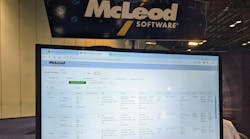SAN DIEGO - There is less concern today than just a few months ago about how many fleets have yet to start the transition to electronic logging devices (ELDs), according to Jim Mullen, chief counsel of the Federal Motor Carrier Safety Administration.
Fleets that have been using automatic onboard recording devices (AOBRDs) have until Dec. 16 to switch. As they shift to full time ELD use, “we understand there are nuances the industry has not encountered yet,” said Mullen.
Speaking at American Trucking Associations’ Management Conference & Exhibition, Mullen labeled these nuances as “collateral consequences” that often impact back office personnel at least as much as drivers.
That has generally been the case for Transport America, said Lisa Gonnerman, vice president of safety.
She said malfunctions are the “No. 1 biggest challenge” with ELDs. The company has previously experienced as many as 1,300 malfunctions in a single week. The majority rectify themselves in within 24 hours, and only about 2% of these issues affect a driver’s hours of service, Gonnerman said.
Many of the malfunctions involve the ELD losing connection with the engine control module (ECM) for more than five seconds. If that rule was extended to 60 seconds, it would cut into the number of incidents, Gonnerman said.
EROAD is not Transport America's ELD vendor. But in the ATA exhibit hall, Norm Ellis, president of EROAD, explained to Fleet Owner there are several factors that could trigger a malfunction.
Any ELD using Bluetooth will malfunction in the event of a disruption in the connection. (EROAD uses a hardwire connection.)
A malfunction can also be created if a GPS signal drops due to cloud cover or tall buildings in urban areas. Likewise, an ELD accidentally disconnecting from the ECM would cause a malfunction.
Ellis, like Gonnerman, stressed the need for methodical training to help more quickly navigate what FMCSA's Mullen called “collateral consequences.”
In Transport America’s case, planning for the transition to 100% use of ELDs began early in 2019. A pilot group of drivers got involved in June, and nearly all drivers and back office personnel had received training by early October.
The ELD switch has required the creation of companywide policies on personal conveyance, managing yard moves and editing HOS logs. Gonnerman noted Transport America does allow limited personal conveyance for drivers.
Mullen said it is unlikely FMCSA will to provide specific guidance on personal conveyance in the near term, which is even more reason fleets should set their own policies. When looking at the industry as a whole, it can be tricky to set a single policy, especially when considering that some owner-operators use their truck for personal use, he said.



